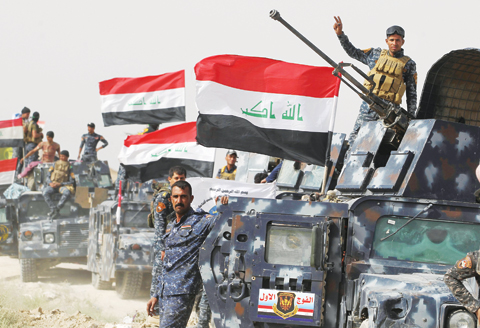 Iraqi pro-government forces gather in Al-Shahabi village, east of the city of Fallujah, on Tuesday, as part of a major assault to retake the city from Islamic State (IS) group. — AFP
Iraqi pro-government forces gather in Al-Shahabi village, east of the city of Fallujah, on Tuesday, as part of a major assault to retake the city from Islamic State (IS) group. — AFPBEIRUT: US-backed Syrian fighters and Iraqi forces pressed twin assaults against the Islamic State group yesterday, in two of the most important ground offensives yet against the jihadists. The operations to the north of IS' de facto Syrian capital Raqqa and near the jihadist-held Iraqi city of Fallujah are adding to pressure on the extremist group, which has seen territory under its control steadily shrinking in recent months.
The US-led coalition that launched air strikes against IS in Syria and Iraq in mid-2014 is providing air support on both fronts, as efforts intensify to dismantle the group's self-styled Islamic "caliphate" straddling the Syrian-Iraqi border. But there is deep concern for thousands of families in both cities, with fears civilians will be caught in the crossfire or used as human shields by the jihadists.
After the start of the Fallujah offensive was announced on Monday, Iraqi troops backed by pro-government militias have been advancing toward the city from surrounding areas. Yesterday, forces from Iraq's 8th Division bolstered by tribal fighters pushed forward from areas to its south, said Staff Major General Ismail Al-Mahalawi, the head of the Operations Command for Iraq's Anbar province. US-led coalition warplanes and Iraqi aircraft were providing support, Mahalawi said. In northern Syria, a Kurdish-Arab alliance also backed by coalition strikes was meanwhile pressing the jihadist group in its bastion province of Raqqa.
'Constant Air Strikes'
The Syrian Democratic Forces (SDF), formed in Oct 2015, announced on Tuesday its push for IS territory north of Raqqa city, which is some 90 km south of the Syrian-Turkish border and home to an estimated 300,000 people. The SDF is dominated by the Kurdish People's Protection Units (YPG) - largely considered the most effective independent anti-IS force on the ground in Syria - but it also includes Arab Muslim and Christian fighters.
The SDF already has two footholds north of the city: the border town of Tal Abyad and the smaller town of Ain Issa between Tal Abyad and Raqa city. Yesterday, SDF fighters cleared two fields that lie southeast of Ain Issa, according to a statement distributed to journalists. SDF spokesman Talal Sello told reporters the fighting was taking place in "rural areas. There is no street fighting". "There are no plans yet to liberate Raqqa city, except in a future campaign after this one, depending on the circumstances," he said.
The Syrian Observatory for Human Rights monitoring group said 10,000 to 15,000 SDF fighters were estimated to be taking part in the offensive. "There were constant air strikes on Raqqa by the coalition overnight," Observatory chief Rami Abdel Rahman said. Baghdad-based US military spokesman Colonel Steve Warren said Tuesday the US military would conduct air strikes to support thousands of SDF fighters, some of whom have been trained and equipped by US forces. If Raqqa falls, "it's the beginning of the end of their caliphate," Warren said.
The anti-IS coalition has set its sights on Raqa in Syria, as well as Fallujah and eventually IS's main Iraqi bastion of Mosul. Tens of thousands of civilians remain in all three cities. Coalition planes dropped flyers over Raqa earlier this month urging residents to flee but IS has prevented residents from leaving.
'Human Shields' Slow Assault
SDF spokesman Sello said IS' "use of civilians as human shields" was slowing the drive for rural territory and villages north of Raqqa city. Abdel Aziz Al-Hamza, a co-founder of the prominent Raqqa is Being Slaughtered Silently activist group, said IS was taking cover among civilians in Raqa city too. "In a civilian building, you'll find two or three apartments for ISIS fighters," Hamza said in an interview with AFP, using another acronym for IS. "The civilians are besieged, they can't leave their city," said Hamza, who fled Raqqa in January 2014 and has been living in Germany.
Rights groups have also appealed for safe exit for the estimated 50,000 civilians still inside Fallujah, which was seized by anti-government fighters in early 2014 and later became an IS bastion. With IS also facing increasing pressure in Syria from regime offensives backed by Russian air strikes, analysts say the group will struggle to hold on to the swathes of territory it seized in Iraq and Syria two years ago. The territory "is in the long run too big for (IS) to possibly hold," analyst Romain Caillet said.
But the group, which has claimed a wave of deadly bombings and attacks in the West and across the Middle East, has shown it can continue to operate to horrific effect. On Monday, a spate of IS-claimed bombings in two regime-held cities in coastal Syria left 184 people dead, in what the Britain-based Observatory said were the deadliest bomb attacks in Syria's five-year civil war. - AFP









